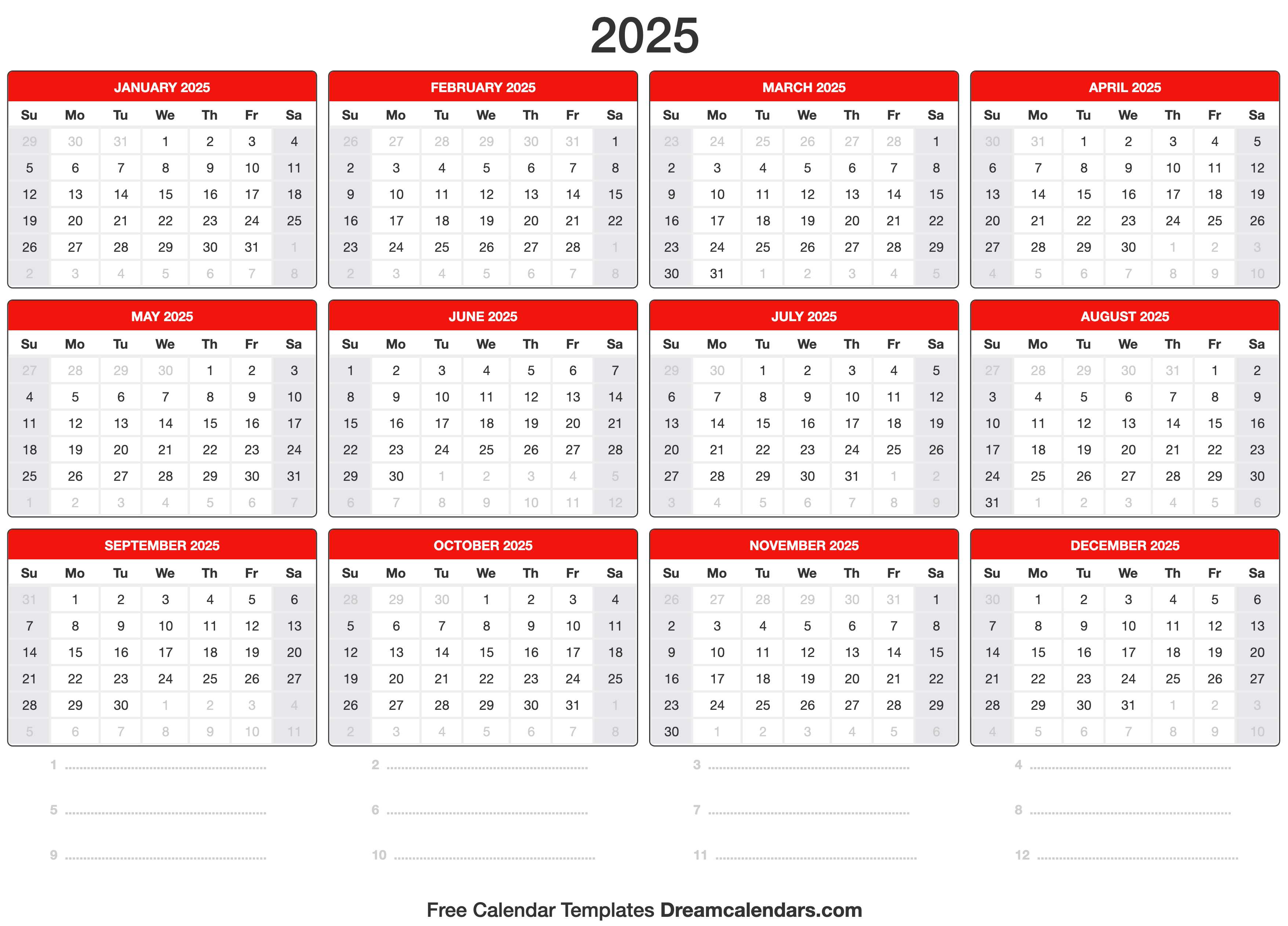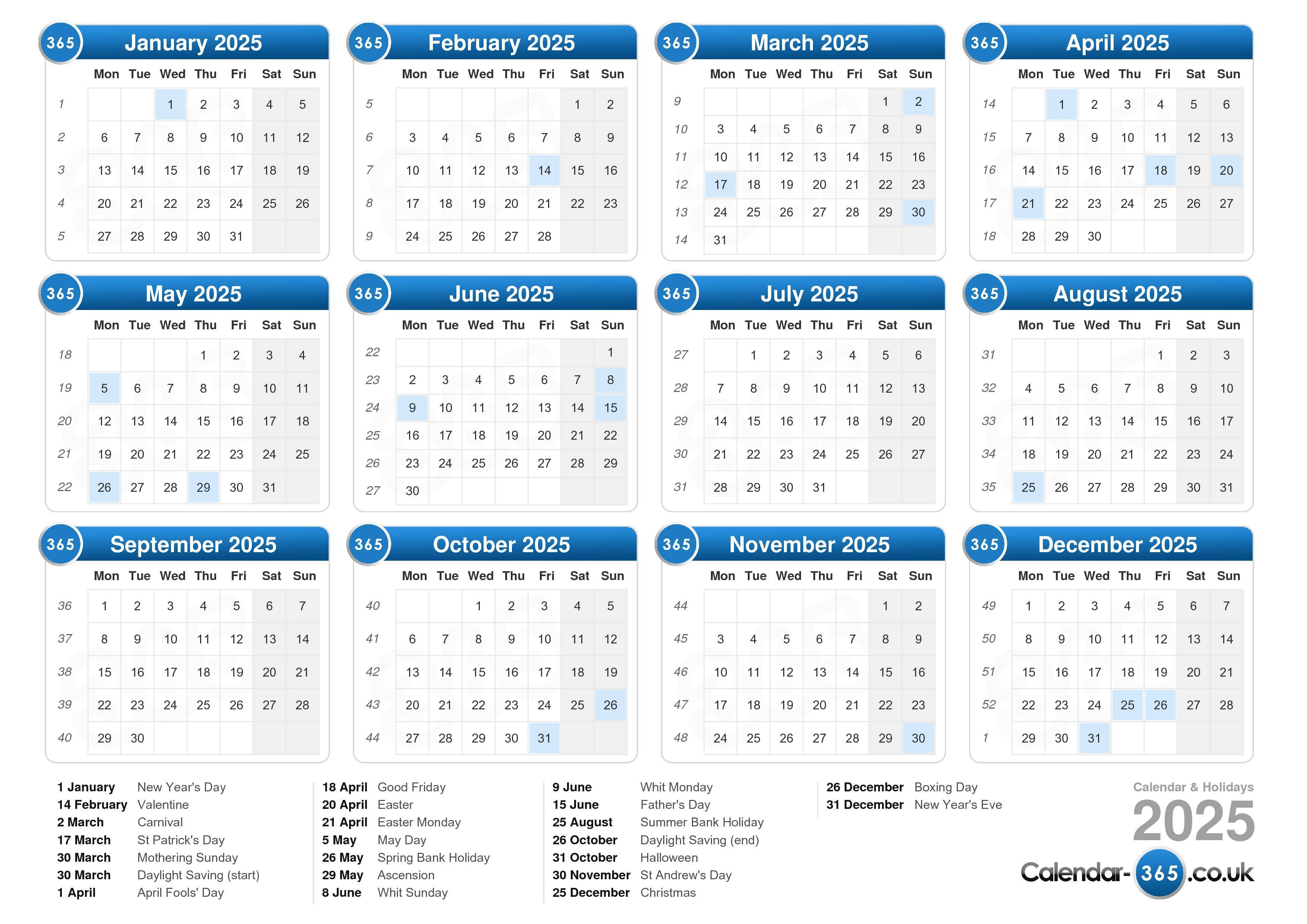Navigating the 2025 Calendar: A Comprehensive Guide to Statutory Holidays
Related Articles: Navigating the 2025 Calendar: A Comprehensive Guide to Statutory Holidays
Introduction
With great pleasure, we will explore the intriguing topic related to Navigating the 2025 Calendar: A Comprehensive Guide to Statutory Holidays. Let’s weave interesting information and offer fresh perspectives to the readers.
Table of Content
Navigating the 2025 Calendar: A Comprehensive Guide to Statutory Holidays

The year 2025 presents a unique tapestry of observances, each woven with historical significance, cultural celebration, and a shared sense of collective pause. Understanding these statutory holidays – days designated for rest and reflection – is crucial for individuals, businesses, and institutions alike. This comprehensive guide aims to illuminate the 2025 calendar, providing a clear and informative overview of each statutory holiday, its historical context, and its practical implications.
January
- New Year’s Day (Wednesday, January 1st): The first day of the year, a universal symbol of fresh starts and renewed optimism, is a statutory holiday in most jurisdictions. It marks the beginning of a new chapter, offering a chance for reflection on the past and anticipation for the future.
February
- Family Day (Monday, February 17th): Celebrated in various provinces across Canada, Family Day emphasizes the importance of familial bonds and community spirit. It provides an opportunity for families to spend quality time together, creating lasting memories and strengthening relationships.
March
- St. Patrick’s Day (Wednesday, March 17th): A cultural celebration honoring the patron saint of Ireland, St. Patrick’s Day is marked by parades, festivities, and the iconic color green. While not a statutory holiday in all regions, it holds significant cultural importance, particularly for those of Irish heritage.
April
- Good Friday (Friday, April 18th): A Christian holiday commemorating the crucifixion of Jesus Christ, Good Friday is observed as a day of solemn reflection and remembrance. It is a time for introspection and contemplation on the themes of sacrifice and redemption.
- Easter Monday (Monday, April 21st): Following Good Friday, Easter Monday celebrates the resurrection of Jesus Christ. It is a time for joy, renewal, and hope, often marked by family gatherings and festive traditions.
May
- Victoria Day (Monday, May 19th): This holiday commemorates the birthday of Queen Victoria, a significant figure in Canadian history. It is a time to reflect on the legacy of the British monarchy and its influence on Canadian identity.
June
- Canada Day (Wednesday, June 1st): A national celebration of Canadian unity and independence, Canada Day is marked by parades, fireworks, and community events. It is a day to celebrate the country’s diverse heritage and its ongoing evolution.
August
- Civic Holiday (Monday, August 4th): Celebrated in various provinces and territories, Civic Holiday is a day to honor local communities and their contributions. It is often marked by local events and celebrations, fostering a sense of civic pride.
September
- Labour Day (Monday, September 1st): A national holiday dedicated to the achievements of workers, Labour Day recognizes the contributions of all working individuals and celebrates the principles of organized labor. It is a time to reflect on the importance of fair working conditions and social justice.
October
- Thanksgiving Day (Monday, October 13th): A national holiday celebrating gratitude for the harvest and the bounty of the land, Thanksgiving Day is a time for family and friends to gather and express appreciation for their blessings.
November
- Remembrance Day (Wednesday, November 11th): A solemn day of remembrance for those who have served and sacrificed in the armed forces, Remembrance Day is a time to honor the courage and dedication of veterans and to reflect on the importance of peace and freedom.
December
- Christmas Day (Wednesday, December 25th): A Christian holiday celebrating the birth of Jesus Christ, Christmas Day is a time for family gatherings, gift-giving, and festive traditions. It is a day of joy, generosity, and goodwill.
- Boxing Day (Thursday, December 26th): Traditionally a day for giving gifts to those who provided services during the year, Boxing Day is now often celebrated as a day for relaxation and spending time with loved ones.
Understanding the Importance of Statutory Holidays
Statutory holidays serve several critical functions, impacting individuals, businesses, and society as a whole:
- Promoting Work-Life Balance: Statutory holidays provide a designated time for rest and rejuvenation, fostering a healthy work-life balance. This allows individuals to recharge, spend time with loved ones, and pursue personal interests, ultimately enhancing their well-being.
- Strengthening Community Ties: Many statutory holidays are rooted in cultural and historical significance, providing opportunities for communities to come together and celebrate shared values. This fosters a sense of belonging and strengthens social cohesion.
- Preserving Historical Memory: Observing statutory holidays commemorating significant events or individuals helps preserve historical memory and ensures that these events are not forgotten. This fosters a sense of national identity and a shared understanding of the past.
- Stimulating Economic Activity: Statutory holidays often lead to increased spending on travel, entertainment, and other goods and services, stimulating economic activity. This benefits businesses and contributes to overall economic growth.
Frequently Asked Questions (FAQs)
Q: Are statutory holidays the same in every province and territory?
A: Statutory holidays can vary slightly across provinces and territories. Some provinces may observe additional holidays, while others may have different names for the same holiday. It is essential to consult local regulations for specific details.
Q: What happens if a statutory holiday falls on a weekend?
A: In most jurisdictions, if a statutory holiday falls on a Saturday or Sunday, it is typically observed on the following Monday. This ensures that employees receive a day off for the holiday.
Q: Are employees required to work on statutory holidays?
A: Generally, employees are not required to work on statutory holidays. However, certain industries, such as healthcare, may have exceptions. It is important to refer to employment agreements and local regulations for specific details.
Q: What are some tips for making the most of statutory holidays?
Tips for Maximizing Statutory Holidays
- Plan Ahead: Avoid last-minute stress by planning activities in advance. This could include booking travel, making reservations, or organizing family gatherings.
- Embrace the Moment: Use statutory holidays as an opportunity to disconnect from work and fully engage in leisure activities. This could include spending time with loved ones, pursuing hobbies, or simply relaxing and recharging.
- Consider Volunteering: Many organizations need volunteers on statutory holidays. This is a great way to give back to the community and make a difference.
- Be Mindful of Travel: If planning travel during a statutory holiday, book flights and accommodations well in advance to secure the best deals and avoid potential disruptions.
- Respect Cultural Differences: If celebrating a statutory holiday with individuals from different cultural backgrounds, be respectful of their traditions and customs.
Conclusion
The statutory holidays of 2025 offer a unique tapestry of observances, each imbued with historical significance, cultural celebration, and a shared sense of collective pause. Understanding these holidays, their historical context, and their practical implications is crucial for individuals, businesses, and institutions alike. By recognizing and celebrating these designated days of rest and reflection, we foster a sense of community, preserve historical memory, and promote a healthy work-life balance. As we navigate the year 2025, let us embrace these opportunities for connection, rejuvenation, and remembrance, enriching our lives and strengthening the fabric of our society.








Closure
Thus, we hope this article has provided valuable insights into Navigating the 2025 Calendar: A Comprehensive Guide to Statutory Holidays. We thank you for taking the time to read this article. See you in our next article!